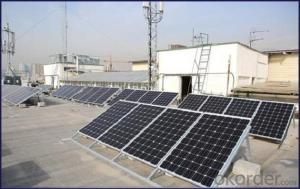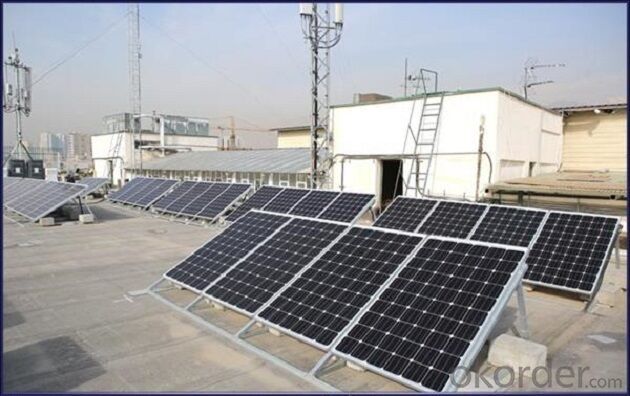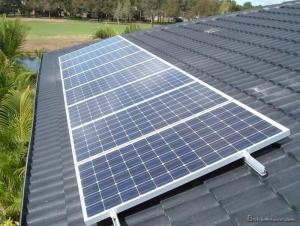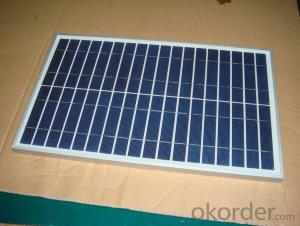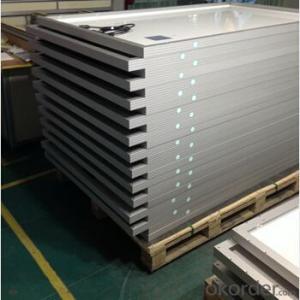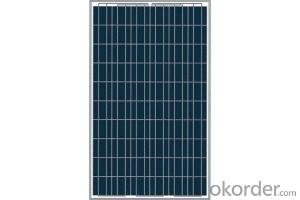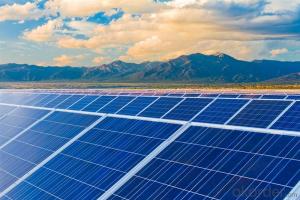Small Solar Panels for Sheds - CE and TUV Approved 235W Mono Solar Panel
- Loading Port:
- Shanghai
- Payment Terms:
- TT OR LC
- Min Order Qty:
- 10000 watt
- Supply Capability:
- 1000000 watt/month
OKorder Service Pledge
OKorder Financial Service
You Might Also Like
Specification
1. Detailed Introduction for Mono solar panel
Type | CNBM Solar Monocrystalline Series |
Materials | Silicon |
Guarantee | 12 yrs free from defects in materials and workmanship No less than 90% within 10yrs and no less than 80% within 25yrs TUV(IEC61215&IEC61730), CE, UL |
Application | Photovoltaic/ solar/ green energy/ energy saving |
Descriptions | 1.High efficiency crystalline silicon solar cell. Even if under the weak light, the solar module can produce maximum power output. 2.Tempered glass (toughened glass): Anti-reflecting coating and high transmission rate glass increase the power output and mechanical strength of solar module. 3. EVA and TPT: Using high quality EVA and TPT to prevent destroying and water. 4. AI frame: Without screw, rner connection. 6 holes on the frame can be installed easily. 5. Junction box: Multi function junction box with water proof. 6. Long lifetime: ≥25 years; Less power decrease. 7. Good performance of preventing from atrocious weather such as wind and hails. 8. Resisting moisture and etching effectively, not effected by geology. 9. The certificate issued by international authority: UL, TUV, IEC, CE.
|
Packaging Details: | 26pcs/pallet, 28pallets/ 40HQ Our solar panels are packed in cartons, and then pallet. Shipping by sea or by air are both ok, it up to customer’s chose. We’d like to inquiry the freight cost for customer after be informed exact quantity and destination address. |
2. Technology
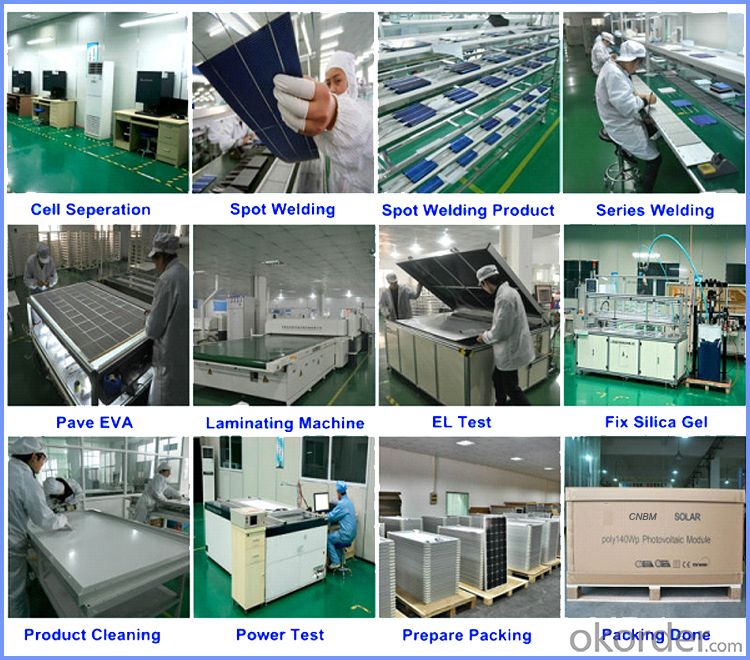
3. Use For
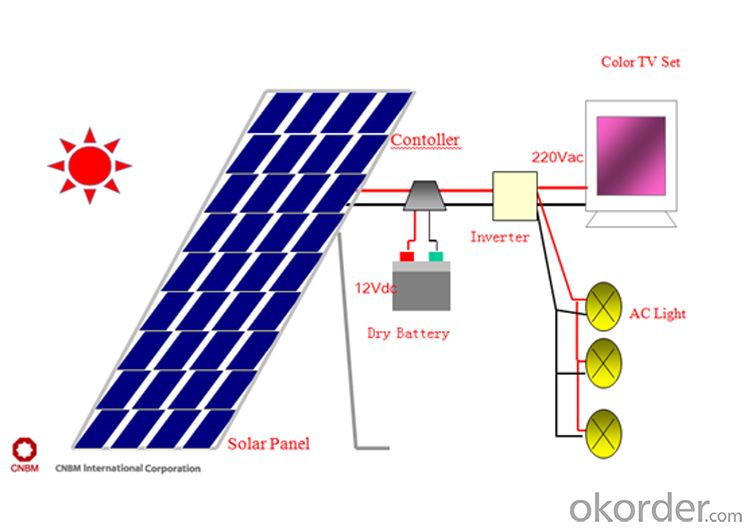
4. The Pictures of the Products
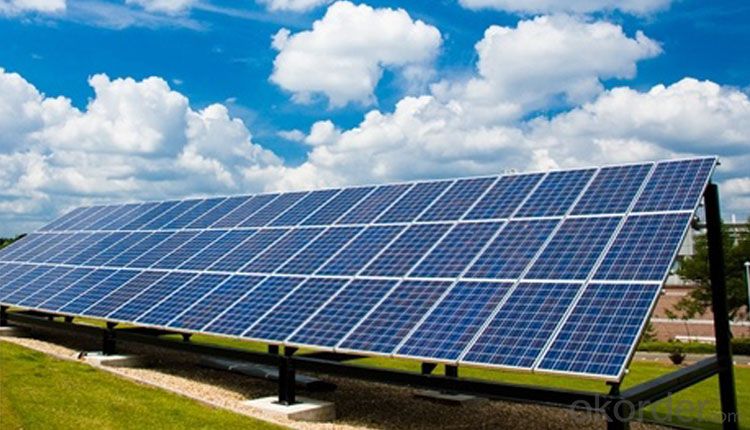
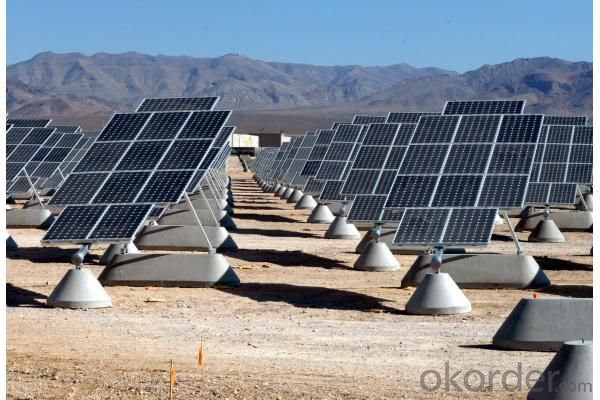
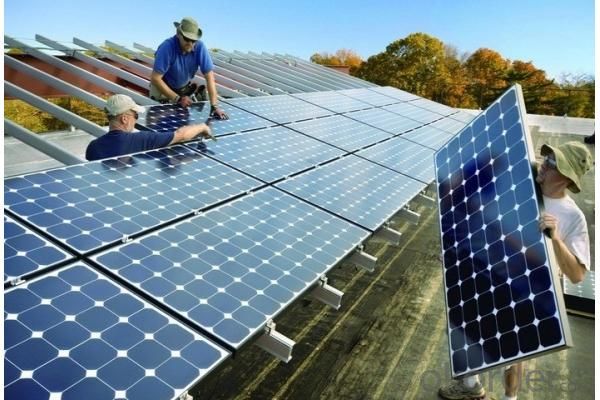
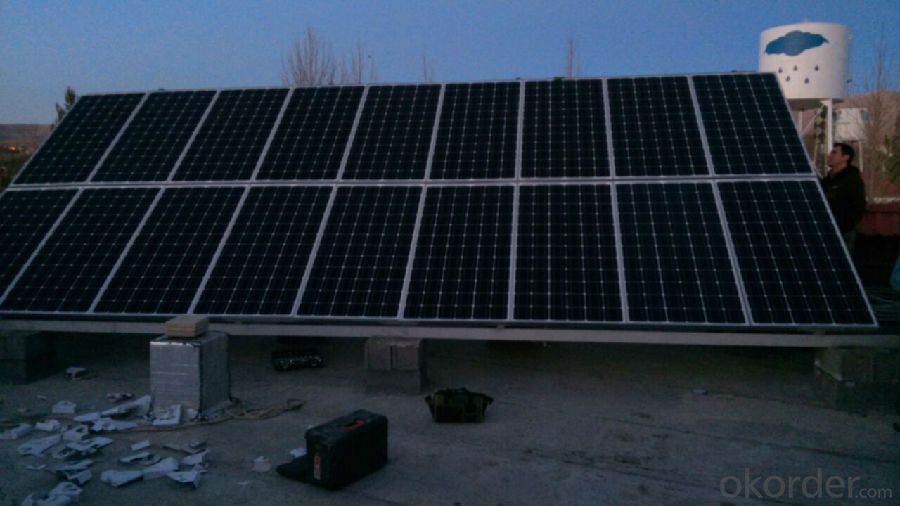
5. Packing Details
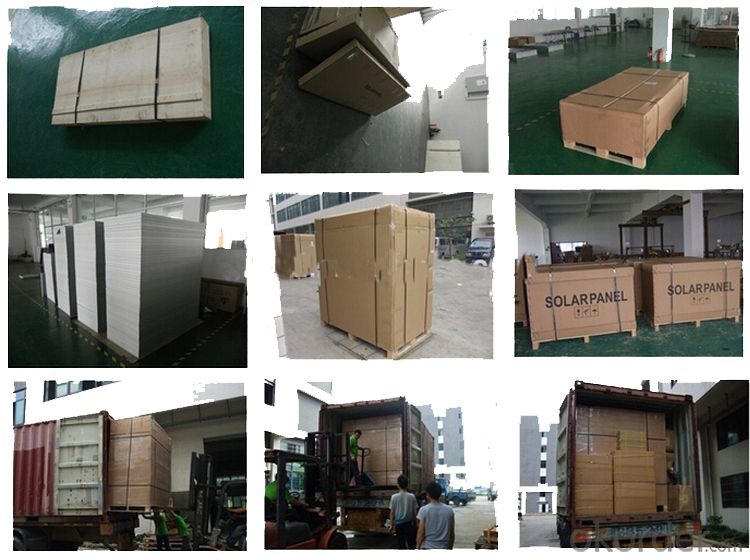
6. FAQ
1). Warranty
Our product performance guarantees for 25 years
12 years guarantee for workmanship
Timeliness of delivery
Quality Products certified (TÜV, UL, CE, ISO)
2). Can you tell me the parameter of your solar panels?
We have different series of cells with different power output, both from c-si to a-si. Please take our specification sheet for your reference.
3). How long can we receive the product after purchase?
In the purchase of product within three working days, We will arrange the factory delivery as soon as possible.
The pecific time of receiving is related to the state and position of customers.Commonly 7 to 10 working days can be served.
- Q: Hi. I need to build a solar panel for a project. it should be able to light a 60 watt light bulb. also, it should be about 3x3 ft if it is 50% efficient. if anyone knows any websites or can help me, please answer! thanks.
- Making your own photovoltaic (solar electric) panel is a nontrivial matter if you want to get 60 watts out of it. If this is a science fair project, there are some possible paths that I'd suggest: ) Make your own cupric oxide panel. With just one square foot, you can harvest perhaps 0.5 mW in bright sun - enough to power a solar calculator; -or- 2) Buy a panel to light your 60 watt bulb. You could probably get away with a panel that is 6 square feet, but would use a car headlight as the lamp. If you wanted to light a regular household bulb, you would need electronics to step up the voltage, and you would lose a sizeable fraction of the energy just in the conversion. -or- 3) Buy broken solar cell pieces, or individual solar cells, and solder them together into your own panel. This is a LOT of trouble, and is a finicky process to get working and keep working. And it may not end up being cheaper than buying a ready-made panel. But you can claim that you made it! By the way, crystalline silicon panels are in the ballpark of 5% efficient, and a 3' x 3' one would produce in the neighborhood of 20 watts.
- Q: I am trying to built a circuit that will power two USB ports (both 5V and 0.5 amps) from the output of a solar panel that produces 20V at 0.2 amps. I have a voltage regulator that runs at 5v and 0.5 amps but I can't figure out the best way to boost the current up to 0.5 amps before I incorporate the voltage regulators.
- If you want to power both USB ports at the same times, It might not be possibble. Your solar panel only supplies 2.24 Watts (20V * 0.2A) of power and you need to deliver 2.5 Watts (5V * 0.5A) to the ports. Subtracting any losses from your regulator(s), you will be WAY over your power budget. You will need more of a solar panel or less of a load.
- Q: I want to install a solar panel system and our power grid can't work in reverse(so it get its electricity from us). My question is how do you prevent electricity from our panel to go to the grid without disconnecting the grid? How can we also use the grid and the panel at the same time when the panel are not creating enough power?PS dont say ask an electrician
- If you are grid-tied, then a standard solar electric system will always feed back into the grid if you are not utilizing more power in your home than is being generated by the solar panels and inverter system. It is possible that a grid isolation device designed to prevent direct back feeding is available, but haven't heard of one in common use. New laws in most areas of the US are now mandating that utilities allow grid-tied alternative energy systems. Double-check you local laws. Sometimes you can't take the utilities word for truth--most will automatically say 'no' and will only relent when you show up with the law in hand. Unfortunately, some utilities have figured out another way to shut down alternative energy pioneers--they demand multimillion dollar insurance policies covering damage that their equipment could sustain from your little PV system. Technically, they are still in compliance with the law, they just make it impossible for a homeowner to meet their requirements. If you are getting the runaround, go to your state representative for help. It's amazing how contrite those utility people can be when a state senator (or even US Senator) has just sent a letter asking them why they are stonewalling a law-abiding and well-meaning citizen. Good luck, and don't give up!
- Q: my solar panel is 5v 50 mA, and im making iphone USB charger so i need to connect + with 00 ohm resister and to data - and + so what resister will be okay..?
- Just connect the 5 volts out of the panel directly to the iphone via an USB connector. BUT, is the panel output always 5 volts, ±0.25 volts? Because that is the USB specification, and anything outside of those values could damage your iphone. And solar panels are known for their wide swings in voltage. Bottom line, resistor not needed, and you need to be positive you supply the correct voltage to the iphone. Best way to do that is to start with a solar panel that puts out at least 7 volts and use a LM7805 regulator. The only resistors needed are those to tie the data lines into a certain combination of resistance and voltage so that the iphone is fooled into thinking that a proper USB is connected. That would NOT involve a 00 ohm resistor. Search online for the proper values and connections. edit: are you repeating your same inane question with a different account? That is totally against the rules and could get you suspended.
- Q: Can solar panels be used to power a greenhouse?
- Yes, solar panels can be used to power a greenhouse. Solar panels are a sustainable and efficient energy source that can generate electricity to operate various greenhouse systems, such as lighting, heating, ventilation, and irrigation. By harnessing the sun's energy, solar panels provide a clean and renewable power supply, reducing greenhouse gas emissions and minimizing reliance on conventional energy sources.
- Q: Do solar panels require direct sunlight to generate electricity?
- No, solar panels do not require direct sunlight to generate electricity. They can still generate power even in cloudy or overcast conditions, although the amount of electricity produced may be reduced.
- Q: Can solar panels be installed on a streetlight?
- Yes, solar panels can be installed on a streetlight. This allows the streetlight to be powered by solar energy, reducing reliance on the electrical grid and contributing to a more sustainable and cost-effective lighting solution.
- Q: i am very new to the solar world and i need help with some stuff to understand what i need to do.what AH battery should i use? i am planning on getting a 2V deep cycle gel based battery but i want to get the most power for my system so should i use something like a few 00AH in a battery bank system or a bunch or 50 or so amp hour batteries in a bank. also what kind of power am i looking at for the best battery system. in other words what kind of basic appliances like lighting, laptop,space heaters etc can can i run on the selected battery system and for how long? any help would be highly appreciated.
- This site has some good info and links to more info about renewable and alternative energy. Hope it helps you. Good luck.
- Q: Can solar panels be installed on residential homes?
- Yes, solar panels can be installed on residential homes. They are a popular and effective way to generate renewable energy for households, reduce electricity bills, and contribute to a greener environment.
- Q: what kind of degree do i need to get in order to know everythin about installing solar panels for houses?
- The only degree you will need is a degree in hard knocks.You will get it from a reliable contractor who has the skill and knowledge with the product.You may want to call the manufacture and see if there any in house schools that you could attend and be certified in their product.
Send your message to us
Small Solar Panels for Sheds - CE and TUV Approved 235W Mono Solar Panel
- Loading Port:
- Shanghai
- Payment Terms:
- TT OR LC
- Min Order Qty:
- 10000 watt
- Supply Capability:
- 1000000 watt/month
OKorder Service Pledge
OKorder Financial Service
Similar products
Hot products
Hot Searches
